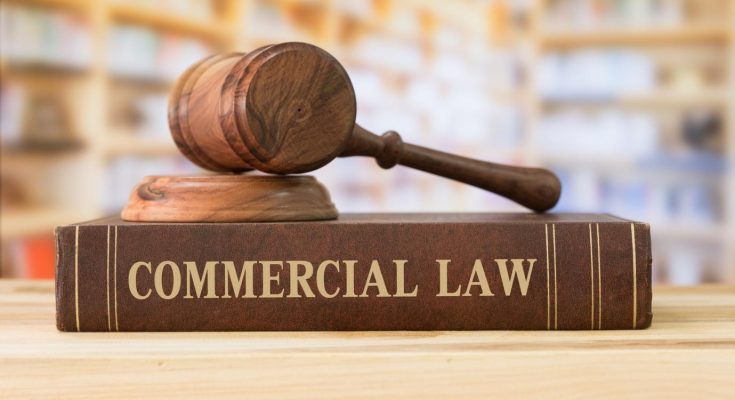If you own a business, you are no doubt familiar with learning about numerous legal issues. Others are general, such as copyright and trademark law, automobile and product liability, and criminal and real estate law.
We will examine several aspects of commercial law. Without further delay, let’s jump in.
1. What is Commercial Law?
Commercial Law, also known as Business Law or Corporate Law, is a vast area of law that covers all business-related matters. It covers:
Contracts
A contract is a legally binding agreement between two parties. To be valid, it must meet certain criteria, such as involving two informed parties who both agree to the terms of the contract.
In addition, the contract must involve some form of consideration from both parties.
Dispute Resolution
It can involve mediation or negotiation of a settlement, or it may involve a third-party arbitrator who listens to both sides of the dispute and makes a decision based on the facts and legal principles.
Bankruptcy
Bankruptcy is a form of commercial law that applies when a business fails to meet its debt obligations. Under certain circumstances, businesses have the opportunity to have their debts forgiven.
Mergers and Acquisitions
Mergers and acquisitions are a major component of commercial law. This is a result of two companies joining forces to form a new organization. These processes involve an intricate set of laws and regulations which must be followed.
Entertainment Law
Entertainment Law is a specialty within the field of commercial law. This covers intellectual property and contracts involved in creative production. Common topics include:
- Copyright and trademark law
- Rights of publicity and privacy
- Contract negotiation and drafting
- Defamation
- Talent and artist agreements
Regulations Related to Business Transactions
Commercial law helps businesses, both domestic and international, remain compliant with statutory requirements. The law provides a legal framework for companies to interact with one another.
It also has provisions that set standards for contracts, including how and what parties can agree to in each contract.
2. The Role of Courts in Commercial Law
Commercial law is a broad area of law that governs the relations of parties involved in commerce. It focuses on how parties interact through contracts, business transactions, and similar activities.
The role of courts in commercial law is essential in providing legal guidance and decision-making to the parties involved. With the expansive reach of modern commercial law, state or federal courts have jurisdiction over different aspects of commercial law. The courts may also act as interpreters of statutes and common law when called upon to do so.
Due to commercial law’s emphasis on protecting parties and ensuring their compliance with applicable laws, courts play a role in oversight of the commercial marketplace to ensure fairness and justice for all involved.
You can also contact general business legal counsel services for legal help today.
3. Core Elements of Commercial Law
Commercial Law is a complex subject, and understanding the core elements is essential. Commercial law can be broken down into three broad categories.
Contracts detail the obligations and rights of parties in a legally binding agreement. Business entities make up the framework by which companies are organized and regulated. Securities law regulates the trading of stocks, bonds, and other financial instruments.
Commercial Law encompasses the laws that govern international, and domestic trade, and financial markets. It is also important to be aware of legislation that regulates business practices, such as competition laws and consumer protection laws.
4. Regulatory Requirements for Commercial Law
Commercial law is a complex and ever-evolving field. It has a direct impact on the outcomes of debtor-creditor relationships. Under the law, creditors are legally entitled to receive payments from debtors.
The law also lays out a number of regulatory requirements that govern such relationships. These include written contracts between:
- Parties
- Disclosure of fees
- Civil liability
- Criminal liability
- Prompt payment
- Collection
- Repossession
- Foreclosure
In order to ensure the smooth operation of debtor-creditor relationships, the law requires them to be conducted in a fair and just manner. Knowledge of all of the above is essential for anyone who is engaging in commercial transactions, both creditors and debtors alike.
5. Enforcement of Commercial Law Compliance
Enforcement of commercial law compliance is important for business owners. This maintains the integrity of the marketplace for both buyers and sellers.
Businesses Should Be Aware
They should be knowledgeable of laws governing contracts and other legal documents. These laws ensure that contracts fulfill the needs of both parties. This ensures a safe and fair agreement.
Businesses Must Understand
They should be aware of liabilities and responsibilities associated with selling products. as well as how to protect themselves if there are any issues with the sale. This could include warranties, refund policies, and remedies for breach of contract.
Businesses Should Be Aware of Consumer Protection Laws
This helps protect the rights of consumers. These laws provide a remedy if a consumer is harmed by a defective product, deceptive business practices, or deceptive advertising.
Knowing these regulations and abiding by them can help businesses create a safe and compliant environment for customers.
Learn about Commercial Law Today
Commercial law is an incredibly complex and multi-faceted area of law that businesses should become familiar with to ensure their legal ecosystem is in the best shape possible.
To get the most comprehensive understanding of commercial law, consulting an experienced legal professional would be an invaluable asset.
With the right support, businesses can develop long-lasting legal strategies that remain compliant with all applicable laws and regulations. Get ahead of the curve and speak to a legal professional today!
Did you find this article helpful? Check out the rest of our blogs!



